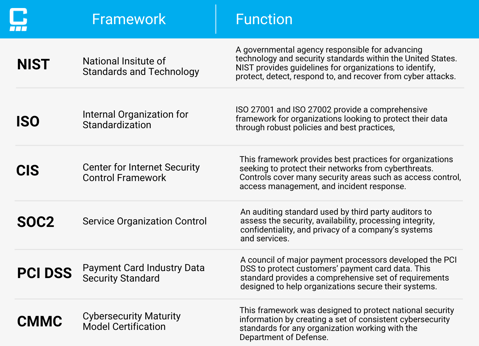Compliance. It's a term that can send shivers down any small business owner's spine. The ever-changing landscape of regulations, from CMMMC for manufacturers to HIPAA for healthcare and FINRA for finance, might seem overwhelming at first. However, embracing compliance can actually serve as a powerful catalyst for creating a secure and thriving SMB. This is where your trusted Managed Security Service Provider (MSP) can play a crucial role.
Why Compliance Matters for SMBs
Cybersecurity threats are no longer the exclusive domain of large corporations. In fact, attackers are increasingly targeting small and medium-sized businesses (SMBs) due to perceived vulnerabilities and lower security budgets. However, compliance regulations serve as crucial roadmaps for strengthening your cybersecurity posture. By adhering to industry-specific frameworks like NIST 800-171 or the specific regulations outlined in frameworks like CMMC, HIPAA, and FINRA, you're implementing essential controls and safeguards that make your business less appealing to attackers.
However, the advantages of compliance extend far beyond mere avoidance of fines and penalties. A robust compliance program cultivates a culture of security within your organization, leading to a reduction in data breaches, safeguarding of sensitive information, and fostering trust amongst customers and partners. Ultimately, compliance becomes a distinguishing factor that gives your SMB a competitive edge in a data-driven world.
.png?width=442&height=370&name=Blog%20Graphics%20(37).png)
Compliance Landscape: Key Frameworks for SMBs
Navigating the vast landscape of compliance regulations can feel overwhelming. With countless frameworks to consider, it's crucial to understand the key cybersecurity compliance frameworks that are relevant to your industry. Here's a breakdown of some essential frameworks that can help you strengthen your cybersecurity posture and ensure compliance in your SMB.
- CMMC (Cybersecurity Maturity Model Certification): A Department of Defense (DoD) requirement for defense contractors and their subcontractors, focusing on five levels of cybersecurity maturity.
- HIPAA (Health Insurance Portability and Accountability Act): Protects the privacy of patients' protected health information (PHI) for healthcare organizations.
- FINRA (Financial Industry Regulatory Authority): Sets standards for financial firms to protect investors and ensure market integrity.
- NIST 800-171: A voluntary framework, but widely adopted, by organizations handling controlled unclassified information (CUI) for the US government.
These frameworks mentioned are just a glimpse into the vast array of regulations that may apply to your SMB, as they depend on factors such as your industry, scope of work, size, and geographic location. However, regardless of the specific regulations, the fundamental principles of data security, access controls, and incident response remain steadfast across most frameworks.

How Your MSP Becomes Your Compliance Partner
This is where your trusted Managed Security Service Provider (MSP) truly shines as your invaluable ally on the path to compliance. With a wealth of experience, an experienced MSP offers a wide range of specialized services that go beyond conventional IT support, all designed to assist SMBs in achieving and upholding compliance. Check out the video below to see the full process of how we do IT:
1. Compliance Gap Analysis and Roadmap:
- Your MSP will assess your current security posture against relevant regulations, identifying gaps and vulnerabilities.
- They will then develop a customized roadmap, prioritizing actions and timelines for achieving compliance.
Partnering with a Managed Security Service Provider (MSP) for compliance goes beyond checking off items on a list. It's an investment in the long-term security, reputation, and growth of your business. With their expertise, experience, and proven track record, your MSP becomes your trusted ally in compliance, guiding you through the ever-changing regulatory landscape and helping you navigate the complex world of compliance management systems, frameworks like NIST 800-171, and industry-specific regulations.



.png?width=442&height=370&name=Blog%20Graphics%20(37).png)





